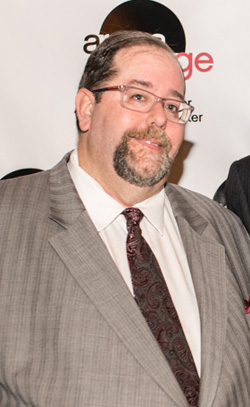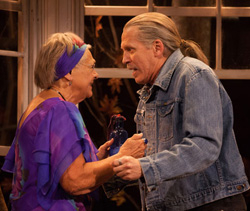How Does an Employment Litigation Attorney Become a Broadway Producer?
Lead Producer Larry Kaye has his eyes set on a Broadway run for Eric Cobble’s ”The Velocity of Autumn”.
Larry Kaye spent nearly two decades as an employment litigation attorney with his own very successful private practice. And then he gave it all up. What could possibly compel him to give up such professional success and strike out on a new and distinctly less-steady career path? It was the allure of the stage, naturally.
As one of New York’s newest lead producers, Kaye is hoping to bring the acclaimed production of The Velocity of Autumn, now playing Washington, D.C.’s Arena Stage, to Broadway. He’s also hoping to bring his experience as a mediator to production meetings and contract negotiations for his shows. Ultimately, the creative process is far more interesting to him than the dog-eat-dog world of litigation. But will he find theater to be just as warm and fuzzy come time for union contract negotiations?
TheaterMania spoke to Kaye about the winding path of his professional life and what he sees ahead. He’s clearly not afraid to take the road less traveled, and he hopes Broadway, as a whole, will see fit to do the same.

(© Cameron Whitman Photography)
What brought you to the theater?
I had a theater background before I became a lawyer. I went to graduate school to get training for an MFA as a director. I didn’t finish the program. It wasn’t a good fit for me. I came back to the Washington area to figure out the next step. While I was sorting through all of that, I decided that it would probably be a great idea, no matter what profession I was in, to have some sort of advanced degree. I decided to go to law school. As I went to law school, I found that I really enjoyed it a great deal. After school, I clerked for a federal judge. All the while, I was remaining involved in theater in one way or another, directing shows on a freelance basis in the Washington, D.C. area.
It sounds like you had it made. What prompted the full switch to theater producer?
After about fifteen years of practice, litigation became less and less satisfying to me. It was clear to me that I was going to want to transform my career in one way or another as I came up on my twentieth year as a litigator. It was not something I wanted to do for the rest of my life. I was working with MetroStage and they were involved in the development of the off-Broadway musical Rooms: a rock romance. They asked me if I’d like to become involved in the show as a producer. Thereafter, as I was going to New York for meetings about the show, I decided that perhaps being a producer would be a good use of my skill set and it would really get me back to theater, which has been the one thing in life that has really fed my soul.
Has your experience as a lawyer informed your new work?
I think it has, not from a contentious point of view, but the opposite. One of the reasons I left litigation is that I grew tired of the constant conflict. This litigation contentiousness really does nobody any good. It has to be a last resort. I recognize that trying to bring people together in a common effort to solve a problem is the best approach. I find that attorneys tend to believe that only they have the answers. In the producing arena, there are also people who have these steadfast rules. For example, a star will automatically make it commercial. But that’s not the case. We’ve seen time and time again shows with a great star flop. But people still hold onto these rules because in some way these rules give them some sort of dubious comfort. What you need is great material, rendered in a great way, marketed well, and you can have a hit. You can’t just pretend bad material is good. You’ve got to have good material.
How do you distinguish between good and bad theater?
The question is: What about the project resonates? What is there about the artistry of the project that is clear? Is the playwright speaking in a new voice, or creating a character or situation that we’ve not seen before? Is there a wisdom that’s going to resonate from the work that might be useful? Is it well constructed? Is there dramatic conflict to provide for a satisfying evening? Is the music memorable?

(© Teresa Wood)
So what drew you to The Velocity of Autumn?
I’ve been following Eric Cobble for a long time. I met him about thirteen years ago and I’ve read most of his plays as he has written them. The world premiere of The Velocity of Autumn was at Boise Contemporary Theater in Idaho. He had a second production planned at a place called the Beck Center in Cleveland. I decided to go out and see it. At the Beck Center the audience sits in two sections that are perpendicular to each other. I spent half my time watching the play and half my time watching the other part of the audience to see how they were reacting. I was really pleased at how moving and funny the play was. I could see that it was affecting the audience pretty uniformly. When the show was over, I stood there at the exit listening to people walk by me. I heard the same thing: how powerful and resonant it was. I knew after that evening that I was going to pursue bringing this show to Broadway.
What does the road to Broadway look like?
We close October 20. We met with theater owners and we’re waiting to find out about availability. I think the theater owners are interested in the play. We’re in a wait-and-see mode. We’re prepared to transfer to Broadway this fall if a theater becomes available.
I read that you turned down a Broadway house earlier this year because it was too large.
Yes, it was about two hundred to three hundred seats larger than we wanted. We’re really looking for no more to than about a thousand seats. It’s a fairly intimate play. The larger the theater you get, the more removed you are from the room where these characters exist. One of the things I learned early in my producing career is that being in the wrong theater is the kiss of death. You can’t want a project to be on Broadway so much that you do things that are injurious to it, like putting it in the wrong theater.
If you could change one thing about the commercial theater business and how it is run, what would it be?
I wish the cost of putting up shows was not so expensive, because I would like ticket prices to be lower than they are, to allow greater opportunities for people to see and experience theater. The ever-increasing cost really makes theater a prohibitive activity for many people. That is a shame.
How do you do that?
I think that there’s been plenty written — always at a time when the contract negotiations are going on with the unions — about ways to cut costs and things like that. I don’t want to get into the subject of how the negotiated deals between unions and producers affect the cost, but they do. It’s important to remember that those are solutions that have been created jointly between unions and producers. I think unions sometimes take a bad rap because producers say, “Well if the unions weren’t so highly paid…” But producers agree to those things and the unions agree to contracts with producers. I wish all the costs associated with putting on a Broadway show (not merely union costs, but costs of materials, concessions, services) could all be subject to some sort of a mediation that causes everyone to understand that the continued vitality of the theater depends in part on finding a way to keep those costs under control. I think everybody needs to step into everybody’s shoes and understand that. I don’t think there’s anything revolutionary in what I’m saying.









